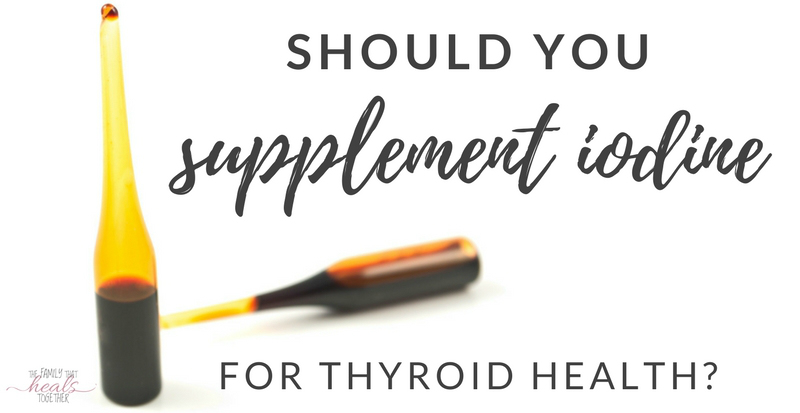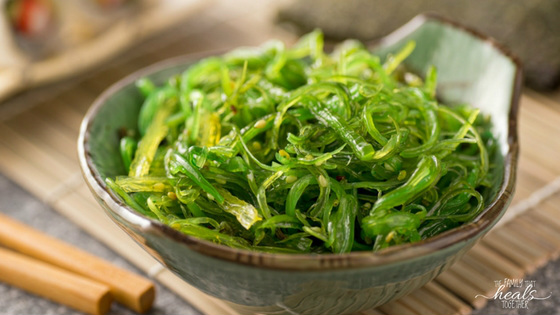We talk a lot about how to promote healthy hormone function, but did you know that iodine is needed for just that reason? Below, contributor Danielle reveals the iodine benefits you need to know about.

Do we need iodine?
Iodine is an essential trace element that is stored in nearly every organ in the body, but over 60% of the body’s supply is found in the thyroid. Iodine is also important for brain function, and muscle and skin health.
Though iodine is essential to a wide number of bodily functions, the most important function of iodine occurs in the thyroid. Without iodine, no thyroid hormones would be synthesized. These hormones control metabolism, remove toxins, and utilize other minerals, such as calcium.
Unfortunately, bromine, found in processed bread products, and fluoride, found in toothpaste and added to the water supply, deplete iodine in the body. With the majority of Americans brushing with fluoride, then rinsing it down with more fluoride, and consuming high amounts of processed bread products, we find ourselves in an even deeper deficiency.
According to the CDC, iodine deficiency is one of the four major deficiencies in the world. (source) Though the United States is not a developing country, research shows that over half of Americans are deficient in iodine, and that statistic is growing. (source)
The USDA recommends:
- 150 micrograms (mcg) per day for adult men and women
- 220 mcg for pregnant women
- 290 mcg for lactating/breastfeeding women
But these amounts may not be enough for optimal thyroid function, thyroid healing, and women who are pregnant.
What are the types of iodine?
There are a number of forms of iodine supplements – including nascent, potassium iodide, and lugols.
- Nascent iodine has an incomplete number of electrons, giving it an electromagnetic charge and reported better absorption in the body when consumed orally. The body recognizes nascent iodine as what it uses to make the T3 and T4 hormones (learn more about those here). Most prefer this form of iodine supplementation. Get it here.
- Potassium iodide is the most common form of iodine, and most inexpensive to produce. Only about 20% of potassium iodide is absorbed by the digestive tract, and thus not the best choice for iodine supplementation. Get it here.
- Lugol’s iodine is made up of potassium iodide plus iodine in a distilled water solution. Breast tissue favors this type, and it has also been found to help inhibit hormone secretion. Get it here. (Jaclyn’s note: this is my preferred type of iodine, and I use it to paint on my skin; a palm-sized amount is the general suggestion.)
Iodine supplements may be taken orally or topically.
Painting is applying a solution topically to the skin. The idea behind this method is that the body will only consume that which it truly needs, and you can actually measure and observe the amount taken in. It also allows the iodine to reach the ideal destination in a higher concentration. One study found that iodine bioavailability increased seven times when painted on the problem area. (source)
What foods are rich in iodine?
Iodine-rich soil is found by the coasts, so one is much more likely to experience iodine deficiency in the middle regions of the country. However, the soil has been depleted of every mineral in recent decades, leading to iodine deficiency in soils everywhere.
This adds up to simply not enough iodine in our diet, even if we eat a whole foods diet. Boosting your intake of iodine-rich foods is a great start, but also consider adding with a quality iodine supplement as well.
Foods rich in iodine include:
- Seaweed (my kids love these!)
- Blueberries
- Yogurt
- Cheese
- Navy beans
- Strawberries
- Potatoes
- Eggs
- Fish
- Green beans
- Bananas
- Prunes

Seaweed salad
Why should I take iodine?
Everyone should include iodine-rich whole foods in their diet. Those experiencing infertility, constipation, mood disorders, and those with mental or physical impairments or planning to get pregnant should consider consistent iodine supplementation.
It’s extremely important for those planning to conceive to have optimum iodine levels. Low maternal iodine has been linked to autism (source), physical and mental growth issues, mental retardation, and cretinism. Continue taking iodine through breastfeeding to ensure your baby has an adequate supply of iodine, too.
Iodine benefits include:
- improved energy
- healthy fertility
- strengthened immune function
- enhanced detoxification
- improved thyroid health
Who is iodine supplementation NOT recommended for?
Although iodine is imperative for thyroid health and can be a cure for those with hypothyroidism and even hyperthyroidism, it is not recommended for those with the autoimmune thyroid disease Hashimoto’s.
Chris Kesser, an integrative medicine specialist, explains why this happens:
“Because increased iodine intake, especially in supplement form, can increase the autoimmune attack on the thyroid. Iodine reduces the activity of an enzyme called thyroid peroxidase (TPO). TPO is required for proper thyroid hormone production.
On the other hand, restricting intake of iodine can reverse hypothyroidism. In one study, 78% of patients with Hashimoto’s regained normal thyroid function with iodine restriction alone.” (source)
Those taking high blood pressure medications, diuretics, or anti-thyroid medications should not supplement iodine, or should first consult their physician to be sure iodine supplementation would not interfere with their medication.
The importance of iodine co-factor supplementation
There’s a great deal of evidence that adequate selenium levels will allow those with Hashimoto’s to be able to consume iodine safely and gain its benefits. If you are looking to treat your Hashimoto’s, do a lot of research, and consider supplementing selenium before supplementing iodine. (The
It’s possible to have too high of selenium levels, however, especially if you have a MTHFR mutation. It’s best, if you are trying to treat Hashimoto’s or any thyroid disease, to get your iodine and selenium levels checked before beginning a supplement regimen. (Jaclyn’s note: Brazil nuts are an excellent source of selenium and are my preferred source! However, in the case of severe deficiency or imbalance, high doses of selenium may be necessary. This should be done under the care of a functional medicine doctor. According to Dr. Jolene Brighten, a maintenance dose of 200mcg per day of selenium may be sufficient once levels have been normalized.)
Most vitamins and minerals need certain other vitamins and minerals to perform their necessary functions perfectly. These are called cofactors or companion nutrients. Important cofactors for iodine include selenium (minimum 200 mg per day), magnesium (minimum 400 mg per day), vitamin C (minimum 2,000-3,000 mg per day), and vitamins B2 and B3 (100 mg riboflavin and 500 mg niacin per day). Vitamin B1 (thiamin) may also be required to activate the thyroid hormone. (source)
Iodine deficiency symptoms include:
- Goiter
- Lack of sweating
- Pain in muscles or low muscle tone
- Stillbirth
- Spontaneous abortion
- Stunted physical growth
- Delayed intellectual development
- Cretinism (a serious developmental delay in child, typically due to severe maternal hypothyroidism)
- Frustration
- Depression
- Decreased fertility
- Weight gain
- Constipation
- Fatigue
- Bumpy skin
- Mental retardation
How much iodine does a person need?
Though the USDA has set the recommended daily amount (150 mcg for men and women, 220 mcg for pregnant women, and 290 mcg for nursing women), many holistic doctors have purported that it’s not nearly enough for healthy function.
According to Dr. Flechas M.D. M.P.H., who has overseen a number of pregnancies and done extensive study on iodine in the body, a 110-pound woman’s breasts need 5 mg of iodine a day, the thyroid needs 6 mg of iodine a day, and other lymphatic organs need another 2 mg a day. (source) To his credit, it’s been found that the body can hold 1,500 mg of iodine, with 50 mg being held in the thyroid alone. (source) Note that these are milligrams, not micrograms.
A number of studies beginning in the early 1900s have shown that high iodine supplementation is not only safe, but can treat cancer, hypothyroidism, and goiter. (source)
Iodized salt has been a thing in the United States since U.S. manufacturers started adding iodine to table salt in the 1920s to prevent iodine deficiency. On average, 45 mcg of iodine can be found in one eighth teaspoon of table salt. Today, U.S. manufacturers are supposed to put non-iodized salt into their products to prevent too high intake of iodine.
You can supplement iodine by table salt, or the better option of pink Himalayan sea salt. A large portion of iodine supplements are derived from kelp. Some have great additives, like selenium, but research which is best for you. (source)
What are the symptoms of too much iodine?
Consuming too much iodine is hazardous. Monitor your symptoms when supplementing iodine, as taking too much iodine can result in the conditions below.
- Mouth or throat burning (if a high dose is taken)
- Thyroid cancer or inflammation
- Goiter
Remember that those taking certain prescriptions should not supplement iodine (see above).
The National Institute for Health notes these doses as the maximum level of iodine that should be consumed daily (source):
- Birth to 1 Year: No amount specified
- 1-3 Years: 200 mcg
- 4-8 Years: 300 mcg
- 9-13 Years: 600 mcg
- 14-18 years: 900 mcg
- Adults: 1,100 mcg
Iodine is an essential mineral that should be a staple in your whole foods diet. It is especially important for those trying to conceive, as well as pregnant and nursing moms to have an adequate intake of iodine in their diet or supplement regimen.
Those suffering from metabolism issues and hormonal imbalance, including thyroid diseases, could also find relief through supplementing iodine, although it should be done with caution.





